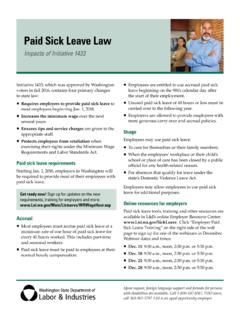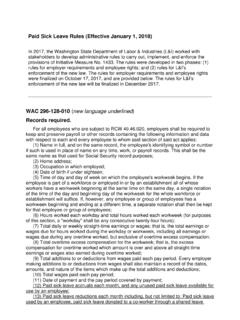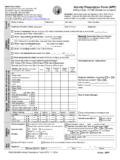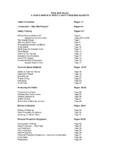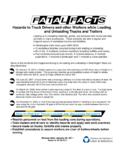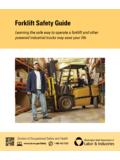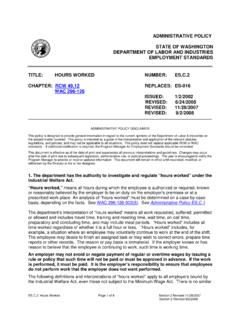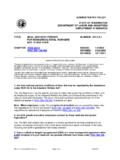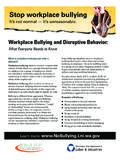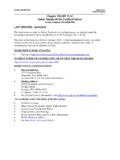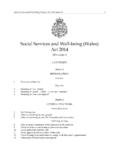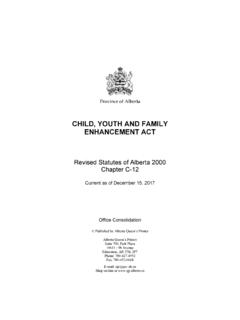Transcription of STATE OF WASHINGTON DEPARTMENT OF …
1 STATE OF WASHINGTON . DEPARTMENT OF LABOR AND INDUSTRIES. EMPLOYMENT STANDARDS. TITLE: FREQUENTLY ASKED QUESTIONS ABOUT NUMBER: THE FAMILY care ACT. CHAPTER: RCW - 295. WAC 296-130 ISSUED: 5/29/2003. REVISED: 10/31/2003. REVISED: 8/20/2006. REVISED: 12/03/2009. REVISED: 8/6/2014. ADMINISTRATIVE POLICY DISCLAIMER. This policy is designed to provide general information in regard to the current opinions of the DEPARTMENT of Labor & Industries on the subject matter covered. This policy is intended as a guide in the interpretation and application of the relevant statutes, regulations, and policies, and may not be applicable to all situations. This policy does not replace applicable RCW or WAC. standards. If additional clarification is required, the Program Manager for Employment Standards should be consulted. This document is effective as of the date of print and supersedes all previous interpretations and guidelines. Changes may occur after the date of print due to subsequent legislation, administrative rule, or judicial proceedings.
2 The user is encouraged to notify the Program Manager to provide or receive updated information. This document will remain in effect until rescinded, modified, or withdrawn by the Director or his or her designee. In 1988, the Legislature established minimum standards for family leave, which led to the original Family care rules, Chapter 296-130 WAC. The Legislature recognized the changing nature of the work force and the competing demands on families brought about by increasing numbers of working mothers, single-parent households, and dual-career families. In addition, the Legislature recognized that it was in the public interest for employers to accommodate employees by providing reasonable leave from work for family reasons. Page 1 of 8 April 2014. In January 2003, changes to RCW through took effect, allowing employees with available sick leave or other paid time off to care for sick family members in addition to children under age 18.
3 New rules were adopted and became effective January 6, 2003. In July 2005, a further legislative change to the definition of sick leave or other paid time off provided that certain disability plans are also included. The updated Family care Rules became effective June 1, 2006. Questions and answers about elements of the law 1. What is the Family care Act? Under the law, employees in WASHINGTON STATE are entitled to use their choice of sick leave or other paid time off, including certain disability plans (see question 18 below): to care for a child with a health condition that requires treatment or supervision;. to care for a spouse, parent, parent-in-law, or grandparent, who has a serious health condition or an emergency health condition; and, to care for children 18 years and older with disabilities that make them incapable of self- care . Grandparents-in-law, grandchildren, and siblings are not covered by the Family care Act.
4 2. What kind of leave and what family members are included in the Family care Act? The law allows employees to use earned sick leave to care for a sick child under the age of 18. years. Employees may use available sick leave or other paid time off, including vacation time and certain disability plans, to care for a sick child or other family members covered by the law (spouses, registered domestic partners, parents biological or adoptive parents, parents-in-law, grandparents). An employer is prohibited from discharging, demoting, or disciplining employees for exercising their rights under the law. Violations of the Family care Act provisions may result in a civil penalty. 3. Which employees are entitled to the provisions under this law? All employees who have paid-leave benefits in WASHINGTON STATE are covered by this law, regardless of the size of the employer. 4. When must an employer allow an employee access to their sick leave or other paid time off to care for a sick family member?
5 If an employee is entitled to paid leave ( , sick leave, vacation, holiday leave or other paid time off), the employee must also be allowed to use that paid leave to care for a sick family member. Page 2 of 8 April 2014. 5. Does the law require businesses to offer sick leave or provide longer periods of leave? No. The STATE law simply assures that employees who do have sick leave or other paid time off are able to use this leave to care for sick family members. 6. What is meant by other paid time off? . Other paid time off is any paid leave other than sick leave, such as vacation or personal holidays. Employees must be allowed to use any and all of their sick leave or other paid time off to care for sick family members. Many employers combine paid leave categories such as sick leave and vacation leave, often described as paid time off or PTO . Employers may require employees to use this combined leave as a prerequisite to using leave designated for a specific purpose, such as extended illness bank leave.
6 7. When must an employer allow an employee access to extended illness bank (EIB). leave to care for a sick family member? For those employers who use an extended illness leave bank (EIB), if the EIB is part of a sick leave policy, the leave must also be available for the care of a qualifying family member under the same terms as it would be available for the employee's own use. 8. What is meant by the term earned in RCW (as in [a]n employee may not take leave until it has been earned )? There are a variety of ways for any employee to earn leave. It could be earned all at once, such as an allotment that is provided at the beginning of a calendar year. Some employees earn leave on a scheduled basis, such as weekly, per pay period, or per month. The law does not require an employer to give an advance on leave for family care purposes before it is earned by the employee. 9. What is meant by the term entitled in RCW (as in if, under the terms of a collective bargaining agreement or employer policy applicable to an employee, the employee is entitled to sick leave or other paid time off )?
7 It means that employer policies and collective bargaining agreements (CBAs) may define or limit when employees are allowed to take the leave that they have earned as long as the restriction does not affect an employee's choice to use the leave for Family care Act purposes. Employees may not be entitled to use leave until they meet certain restrictions. For example, an employee may have sick leave that the employee has earned, but is not be entitled to use for any purpose because the employee is on probation for six months after the initial hire. Such a restriction is permissible because the employee is not entitled to the leave until the end of the six-month probationary period. However, if a restriction on the use of leave prevents an employee's choice to use that leave for family care purposes, the restriction is invalid and the employee can use his or her leave for family care . For example, if an employer policy requires advanced scheduling for vacation leave, the policy would be inapplicable to an employee who chooses to use vacation leave to take care of a sick family member.
8 While the employer is permitted to establish an advanced Page 3 of 8 April 2014. scheduling policy generally, the policy cannot bar the employee from using vacation leave for Family care Act purposes without violating the choice of leave provision. 10. What is meant by the provision in RCW that says the employer must allow an employee to use any or all of the employee's choice of sick leave or other paid time off to care for a sick family member? Employees must have access to any earned sick leave or other paid time off to care for a sick family member. If employees have access to paid leave for any purpose, then they must have full access to any and all of this paid leave to care for a sick family member. The law directs employers to allow employees their choice of earned paid leave to care for a sick family member, even if the use of that leave is not normally allowed for the employees' own illnesses. 11. Can an employer apply attendance policies to the use of sick leave?
9 Under the Family care Act, an employer must not discharge, threaten to discharge, demote, suspend, discipline, or otherwise discriminate against an employee because the employee has exercised or attempted to exercise any right provided under the Family care Act. The law does not limit the discretion of employers to establish and utilize attendance policies, provided they do not violate the law with regard to employees' access to sick leave or other paid time off to care for a sick family member. While attendance policies and sick leave policies are often intertwined, under these rules, employees are protected from punitive attendance policies when taking leave to care for a sick family member specified in these rules. However, where there is an abuse of a sick leave policy ( , use of leave for inappropriate reasons), an employer's attendance policy may then be applied. 12. Under what circumstances can an employee take time off to care for a child?
10 A "child" includes a biological, adopted or foster child, a stepchild, a legal ward, or a child of a person standing in for a parent. A parent may use available paid time off when their child has a health condition that requires treatment and supervision , which includes: A medical condition requiring treatment or medication that the child cannot self- administer;. A medical or mental-health condition which would endanger the child's safety or recovery without the presence of a parent or guardian; or, A condition warranting treatment or preventive health care such as physical, dental, optical or immunization services, when a parent must be present to authorize the treatment and when sick leave may otherwise be used for the employee's preventative health care . 13. Are behavioral disorders included in the definition of a health condition that requires treatment and supervision for a child under the age of 18? Not necessarily.
